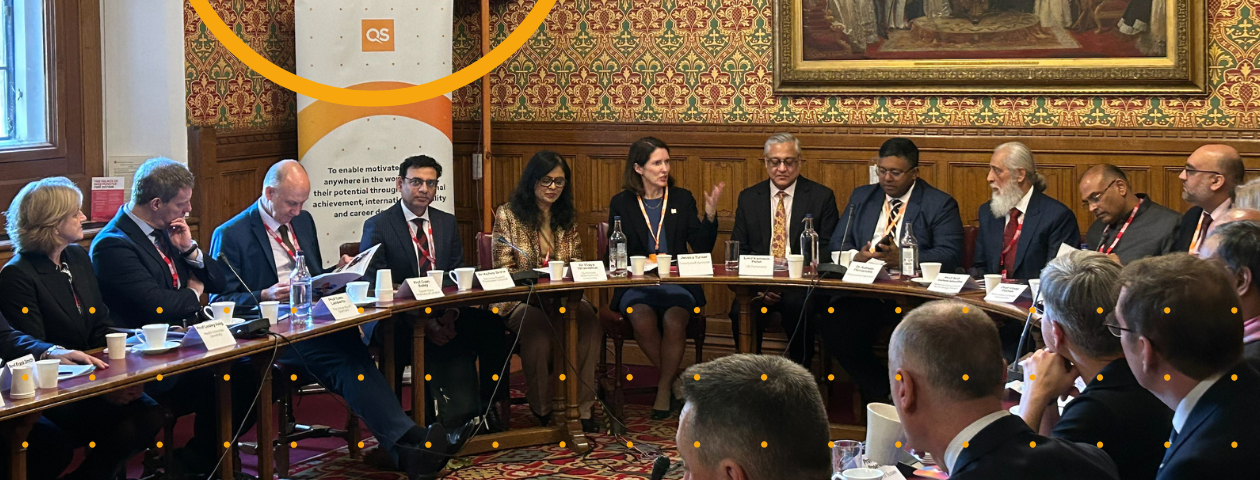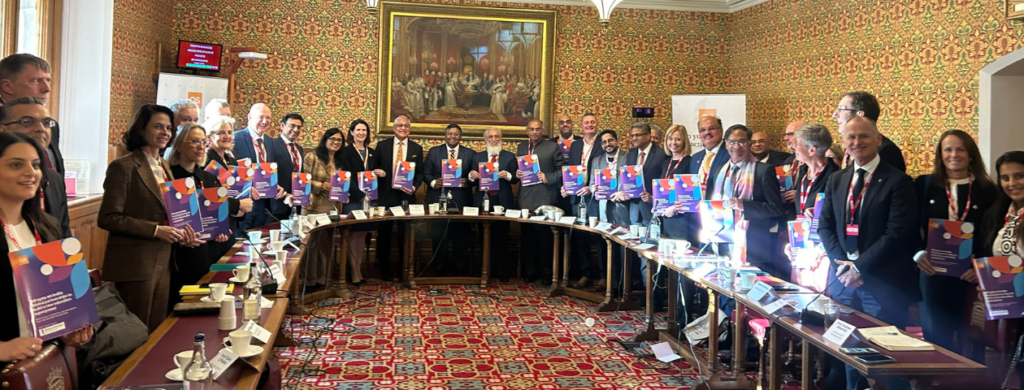
Ahead of the QS India Summit 2025 in January, QS gathered some 45 higher education stakeholders from across the UK and India in the heart of Westminster this week to discuss equitable partnerships.
The wide-ranging discussion, convened by Dr Ashwin Fernandes, QS Executive Director for Africa Middle East and South Asia, drew on what prospective partners in each country need and desire from new arrangements and how best to ensure each agreement is equitable. Here are three key discussion points:
Capacity building
India is “sending too many young pupils to the world”, said Vinay Pathak, President of the Association of Indian Universities. Some 57.2% of the students are from Tier 2 or Tier 3 cities, he added, as he encouraged the UK institutions gathered to engage with institutions in those cities.
It is a theme that Prime Minister Narendra Modi himself has commented on. During this year’s Indian day of independence in August, he stated that his government wants to “build such an education system in India that youngsters do not need to go abroad to study”.
Preparing for such a situation is at top of mind for the Indian education ecosystem – and international universities are also taking note. But there are immediate challenges around capacity for now.
CEO of the Indian government think tank NITI Aayog BVR Subrahmanyam this month noted that India needs to double its number of institutions to 2,500 if it is to meet a target of having 50% of students attend university in 2035.
This is equivalent to creating 15 new universities every week until then, Dr Fernandes said.
“What we want to do beyond partnerships, where you have student exchanges, research, we want to boost that [capacity] in order for India to become the laboratory of the world,” he told the high-level university leaders gathered.
One concrete way that the UK can assist with capacity building is by boosting people with PhDs, suggested Sasha Roseneil, Vice-Chancellor and President, University of Sussex.
“We are doing a lot of work to develop joint PhD programmes where… people can study for a PhD in their own country with supervision from the UK. There is a vast need for that and thinking about how the government might facilitate that across Indian and UK universities is a real opportunity.”
The future of student recruitment in India is in country, one stakeholder in the room commented, adding extra impetus for UK universities to set up transnational education provisions in India.
Innovative models
While the well-covered and much anticipated University of Southampton’s new campus in Delhi, in addition to Deakin University and University of Wollongong in GIFT City, offers one model of TNE, delegates noted that there are other options.
Queen Mary University London operates joint educational programmes with three universities in China, in addition to a medical training campus in Malta. It is this type of model that the institution from the British capital would be most interested in developing, Colin Bailey, President and Principal at QMUL, stated.
“Typically we have done those [other campuses] in partnerships with universities in country and that is a model that we are very interested in in India and we are talking to a number of universities,” he said.

While the University of Southampton’s new campus has been framed around students, the strategy is about much more, Andrew Atherton, Vice-President (International and Engagement), explained.
“Our campus is as much about research, enterprise and engagement as it is about education,” he said. “It is absolutely key that we build up the campus in India as we would anywhere, built on all of those components.
“There are multiple benefits for having a campus in more than one country. For India, the real benefit for us is that we… are now in the Indian ecosystem.”
By being within the ecosystem, Southampton is able to create more partnerships in India. “The more we do that the more integrated into that ecosystem we become,” Atherton added.
Research
“There is no lack of appetite to partner on research partnerships,” Tariq Ali, Pro-Vice-Chancellor Global Engagement and Partnerships at University of Liverpool, said. “But what would be really interesting would be to find how we can collectively unblock or put in pathways for joint funding opportunities between the two countries and research councils that allows us all a fair opportunity to go and bid for funding.
“We have an opportunity in the coming year, with the free trade agreement, to really push for our two governments to do something strategic that would help facilitate both sectors.”
QMUL’s Bailey added, “Let’s try and think about how we can push the countries forward, not just think about the individual universities.”
The QS India Summit 2025 is taking place in January 27-29 in Goa.